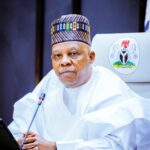The Inter-Governmental Action Group against Money Laundering in West Africa (GIABA) has stated that suspects of large-scale corruption in West Africa are mostly public officials and public office holders who siphoned funds meant for the citizens.
In a communique at the end of a five-day workshop on the ‘Typologies Study of Money Laundering and Terrorist Financing Linked to Corruption in West Africa,’ held in Abuja, it stated that such culprits launder the money in financial or stock market products offered by financial institutions, and through the acquisition of lands and similar real estate properties, agriculture, livestock and other formal or informal business sectors.
It stated that corruption opportunities in the public service are dynamic and mostly driven by human interfaces in service delivery and revenue mobilisation and collection.
The communique, however, said corruption is deeply ingrained in both the public and private sectors with various acts such as embezzlement, theft of public funds, bribery, contract, and procurement.
- NIGERIA DAILY: How Cameroon Dam Could Trigger Flood Disaster In Nigeria
- Now that Prof. Muhammad Ali Pate is the minister, what next?
“On the magnitude of corruption and its negative impacts on national economies. Corruption is one of the predicate crimes for money laundering. It is a major source of illicit proceeds in West Africa, which is laundered using different methods and techniques both at home and abroad. It is also the most potent enabler and facilitator of many criminal activities and a major hindrance to countries’ ability to build robust and effective AML/CFT regimes,” it said.
It noted that corruption and money laundering increase social and economic inequalities, leading to social radicalisation, violent extremism, and terrorism.
“It also results in huge losses of fiscal and customs revenue, which limit states’ ability to provide access to basic social services, especially for provinces and rural populations,” it added.
It said Politically Exposed Persons (PEPs) exercise undue influence on appointments and other activities in the member states to enable anti-graft agencies to perform their duties.
“Typologies and case studies have revealed that obstruction of justice remains one of the bottlenecks to the implementation of effective AML/CFT and anti-corruption regimes,” the communique said.

 Join Daily Trust WhatsApp Community For Quick Access To News and Happenings Around You.
Join Daily Trust WhatsApp Community For Quick Access To News and Happenings Around You.

